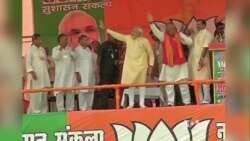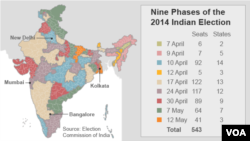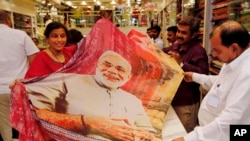NEW DELHI —
It is widely expected Narendra Modi, the chief minister of Gujarat and flag bearer of the opposition Bharatiya Janata Party (BJP), is going to form India’s next government.
Results of the balloting, carried out in nine phases spanning more than a month, are to be announced Friday.
After a record turnout for the world's largest exercise in democracy, Indian voters, according to numerous exit polls, will hand a defeat to the governing Congress Party, which has held power for the past decade, paving the way for a BJP-led alliance to have a second opportunity running the government.
Modi is regarded as an autocratic conservative Hindu, who favors the privatization of publicly held sectors of the economy. But his legacy was stained by deadly anti-Muslim riots in Gujarat on his watch 12 years ago. That led the United States to effectively blacklist Modi during the current and previous U.S. administrations due to human rights concerns.
With no foreign policy track record, though, it is uncertain how he might alter India’s international relations after Prime Minister Manmohan Singh’s decade at the helm.
No part of that riddle is more critical than Modi’s approach toward Pakistan, the Muslim-majority neighbor carved out in the 1947 partition of the subcontinent at the end of British rule.
After their initial 14-month clash on the battlefield over the princely state of Kashmir and Jammu, which began barely two months following partition, India and Pakistan fought three more wars and each has developed nuclear-armed ballistic missiles.
And they continue to dispute control over the divided Kashmir region in the north.
Of all of India’s states, Gujarat shares the longest border with Pakistan. But trade across the two countries' 2,900-kilometer border remains tightly restricted.
Gujarat’s leader was widely viewed during the national election campaign as ignoring Muslim voters and “so if you use that analogy you could have Modi simply ignoring Pakistan, making no special gesture,” says Manoj Joshi, distinguished fellow at the Observer Research Foundation.
Some other political analysts predict relations with Pakistan, both economic and diplomatic, could improve if Modi becomes prime minister, as it did under Atal Bihari Vajpayee, the first BJP prime minister, between 1998 and 2004.
Pakistan’s pragmatic prime minister Nawaz Sharif “will be interested in improving commercial ties, he’s very pro-business” as is Modi, notes political pundit Ajoy Bose. But Bose cautions if India is a victim of another terrorist attack traced across the border to Pakistan, then all bets will be off.
“In which case Mr. Modi would be under tremendous pressure from hardliners in his party. And also for his own image, because he can not afford to look like a wimp and would have to respond in very extreme terms. So that’s where the danger lies,” warns Bose.
India, the world’s largest democracy, also has a border dispute with the only country having a larger population, China.
Beijing is offering to help build and finance nearly one-third of India’s infrastructure development.
That is an offer any Indian government can hardly refuse because voters are expecting a fundamental transformation of their lives, according to Joshi.
“So with China from the economic side I see, probably, enhanced engagement, though Japan is very much there as a competing figure in terms of investment and also we do not have disputes with Japan whereas we have this huge border dispute with China,” he explains.
Some analysts here blame both New Delhi and Washington, each distracted with other pressing issues, for what is widely viewed as maladroit bilateral diplomacy in recent years. They argue the relationship should be much better as the two democracies have no fundamental clash of interests and many shared concerns.
"We look forward to the formation of a new government once election results are announced and to working closely with India's next administration to make the coming years equally transformative,” said President Obama in a statement this week. But the White House and a similar State Department comment avoided mentioning the name of any party or individual.
There are hopes that the not insubstantial number of businesspersons with Gujarat roots among the three million Indian-Americans could be a bridge between a Modi-led government and American officials.
“This relationship needs some love right now,” Sanjay Puri, chairman of the U.S.-India Political Action Committee, told the Associated Press.
Puri organized trips by senior BJP officials to the U.S and hopes the White House will quickly extend an invitation to visit to India’s next leader.
Results of the balloting, carried out in nine phases spanning more than a month, are to be announced Friday.
After a record turnout for the world's largest exercise in democracy, Indian voters, according to numerous exit polls, will hand a defeat to the governing Congress Party, which has held power for the past decade, paving the way for a BJP-led alliance to have a second opportunity running the government.
Modi is regarded as an autocratic conservative Hindu, who favors the privatization of publicly held sectors of the economy. But his legacy was stained by deadly anti-Muslim riots in Gujarat on his watch 12 years ago. That led the United States to effectively blacklist Modi during the current and previous U.S. administrations due to human rights concerns.
With no foreign policy track record, though, it is uncertain how he might alter India’s international relations after Prime Minister Manmohan Singh’s decade at the helm.
No part of that riddle is more critical than Modi’s approach toward Pakistan, the Muslim-majority neighbor carved out in the 1947 partition of the subcontinent at the end of British rule.
After their initial 14-month clash on the battlefield over the princely state of Kashmir and Jammu, which began barely two months following partition, India and Pakistan fought three more wars and each has developed nuclear-armed ballistic missiles.
And they continue to dispute control over the divided Kashmir region in the north.
Of all of India’s states, Gujarat shares the longest border with Pakistan. But trade across the two countries' 2,900-kilometer border remains tightly restricted.
Gujarat’s leader was widely viewed during the national election campaign as ignoring Muslim voters and “so if you use that analogy you could have Modi simply ignoring Pakistan, making no special gesture,” says Manoj Joshi, distinguished fellow at the Observer Research Foundation.
Some other political analysts predict relations with Pakistan, both economic and diplomatic, could improve if Modi becomes prime minister, as it did under Atal Bihari Vajpayee, the first BJP prime minister, between 1998 and 2004.
Pakistan’s pragmatic prime minister Nawaz Sharif “will be interested in improving commercial ties, he’s very pro-business” as is Modi, notes political pundit Ajoy Bose. But Bose cautions if India is a victim of another terrorist attack traced across the border to Pakistan, then all bets will be off.
“In which case Mr. Modi would be under tremendous pressure from hardliners in his party. And also for his own image, because he can not afford to look like a wimp and would have to respond in very extreme terms. So that’s where the danger lies,” warns Bose.
India, the world’s largest democracy, also has a border dispute with the only country having a larger population, China.
Beijing is offering to help build and finance nearly one-third of India’s infrastructure development.
That is an offer any Indian government can hardly refuse because voters are expecting a fundamental transformation of their lives, according to Joshi.
“So with China from the economic side I see, probably, enhanced engagement, though Japan is very much there as a competing figure in terms of investment and also we do not have disputes with Japan whereas we have this huge border dispute with China,” he explains.
Some analysts here blame both New Delhi and Washington, each distracted with other pressing issues, for what is widely viewed as maladroit bilateral diplomacy in recent years. They argue the relationship should be much better as the two democracies have no fundamental clash of interests and many shared concerns.
"We look forward to the formation of a new government once election results are announced and to working closely with India's next administration to make the coming years equally transformative,” said President Obama in a statement this week. But the White House and a similar State Department comment avoided mentioning the name of any party or individual.
There are hopes that the not insubstantial number of businesspersons with Gujarat roots among the three million Indian-Americans could be a bridge between a Modi-led government and American officials.
“This relationship needs some love right now,” Sanjay Puri, chairman of the U.S.-India Political Action Committee, told the Associated Press.
Puri organized trips by senior BJP officials to the U.S and hopes the White House will quickly extend an invitation to visit to India’s next leader.















